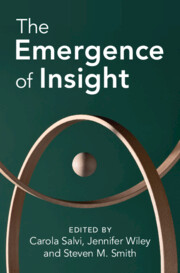Book contents
- The Emergence of Insight
- The Emergence of Insight
- Copyright page
- Contents
- Contributors
- I Introduction
- II Fixation and Insight
- Chapter 2 The Past and Future of Research on So-Called Incubation Effects
- Chapter 3 Forgetting and Inhibition as Mechanisms for Overcoming Mental Fixation in Creative Problem Solving
- Chapter 4 Overcoming Internal and External Fixation in Problem Solving
- Chapter 5 How Impasse Leads to Insight
- III Pathways to Insight
- IV After Insight
- V Cognitive Neuroscience of Insight
- VI Conclusion
- Index
- References
Chapter 3 - Forgetting and Inhibition as Mechanisms for Overcoming Mental Fixation in Creative Problem Solving
from II - Fixation and Insight
Published online by Cambridge University Press: 02 May 2024
- The Emergence of Insight
- The Emergence of Insight
- Copyright page
- Contents
- Contributors
- I Introduction
- II Fixation and Insight
- Chapter 2 The Past and Future of Research on So-Called Incubation Effects
- Chapter 3 Forgetting and Inhibition as Mechanisms for Overcoming Mental Fixation in Creative Problem Solving
- Chapter 4 Overcoming Internal and External Fixation in Problem Solving
- Chapter 5 How Impasse Leads to Insight
- III Pathways to Insight
- IV After Insight
- V Cognitive Neuroscience of Insight
- VI Conclusion
- Index
- References
Summary
Research on creative problem solving has shown that the generation of new ideas and solutions can be impeded by existing ideas and solutions. This phenomenon, known as mental fixation, has been observed in many problem-solving contexts, including the remote associates test (RAT). In the RAT, participants are presented with three cue words and are asked to come up with a fourth word related to each of the cue words. The task can be made more difficult by exposing participants to unhelpful associates that cause mental fixation before they attempt to generate the fourth word. The current chapter reviews research on the mechanisms by which people overcome the effects of mental fixation, focusing on research using the RAT, and on the potential roles of forgetting and inhibition. The results suggest that, at least under certain conditions, the ability to forget, inhibit retrieval, or stop a response can help people overcome mental fixation and thus lead to the experience of creative insight.
- Type
- Chapter
- Information
- The Emergence of Insight , pp. 39 - 59Publisher: Cambridge University PressPrint publication year: 2024

